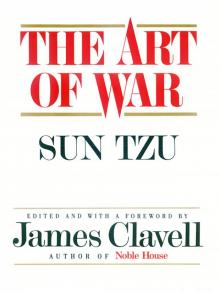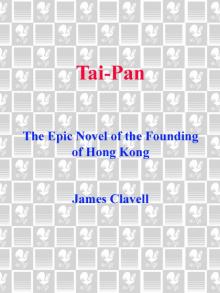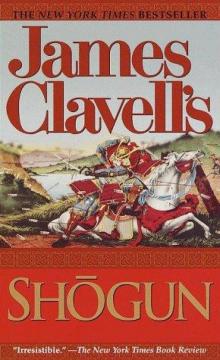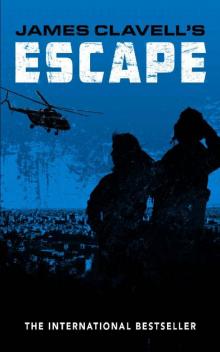- Home
- James Clavell
Escape Page 20
Escape Read online
Page 20
‘This mullah we were discussing, Mahmud,’ the Khan said, ‘he’s very dangerous. Also his band of cut-throats. I think they’re a threat to everyone. The Tudeh should be directed to deal with him. Covertly, of course.’
Mzytryk wondered how much Abdollah knew about their secret support for Mahmud, one of their best and most fanatic converts. ‘The Tudeh must be guarded, and their friends too.’ He saw the immediate flash of irritation, so he compromised and added at once, ‘Perhaps this man could be moved and replaced—a general split and fratricide would only help the enemy.’
‘The mullah’s a false mullah and not a true believer in anything.’
‘Then he should go. Quickly.’ Petr Mzytryk smiled, Abdollah Khan didn’t.
‘Very quickly, Petr. Permanently. And his group broken.’
The price was steep, but the Section 16/a gave him authority enough. ‘Why not quickly and permanently, since you say it’s necessary? I agree to, er, pass on your recommendation.’ Mzytryk smiled and now Abdollah Khan smiled, also satisfied.
‘I’m glad we agree, Petr. Become a Muslim for your eternal soul.’
Petr Mzytryk laughed. ‘In time. Meanwhile, become a communist for your earthly pleasure.’
The Khan laughed, leaned forward, and refilled Petr’s glass. ‘I can’t persuade you to stay for a few days?’
‘No, but thanks. After we’ve eaten, I think I’ll start back for home.’ The smile broadened. ‘There’s a lot for me to do.’
The Khan was very content. So now I can forget the troublesome mullah and his band and another tooth’s been drawn. But I wonder what you would do, Petr, if you knew your saboteur captain and his saboteur soldier were at the other side of my estate, waiting for safe passage out? But out to where? To Tehran or to you? I haven’t yet decided.
Oh, I knew you’d come to beg my help, why else did I keep them safe, why else did I meet them secretly in Tabriz two days ago and bring them here secretly if not for you? Perhaps. Pity Vien Rosemont got killed, he was useful. Even so, the information and warning contained in the code he gave the captain for me is more than useful. He’ll be difficult to replace.
Yes, and also true that if you receive a favour you must return a favour. The Infidel Erikki is only one. He rang a bell and when the servant appeared, he said, ‘Tell my daughter Azadeh she will join us for food.’
Chapter 9
At Tehran: 4:17 P.M. Jean-Luc Sessonne banged the brass knocker on the door of McIver’s apartment. Beside him was Sayada Bertolin. Now that they were off the street and alone, he cupped her breasts through her coat and kissed her. ‘I promise we won’t be long, then back to bed!’
She laughed. ‘Good.’
‘You booked dinner at the French Club?’
‘Of course. We’ll have plenty of time!’
‘Yes, chérie.’ He wore an elegant, heavy raincoat over his flying uniform and his flight from Zagros had been uneasy, no one answering his frequent radio calls though the airwaves were filled with excitable Farsi which he did not speak or understand.
He had kept at regulation height and made a standard approach to Tehran’s International Airport. Still no answer to his calls. The wind sock was full and showed a strong crosswind. Four jumbos were on the apron near the terminal along with a number of other jets, one a burned-out wreck. He saw some were loading, surrounded by too many men, women and children with no order to them, the fore and aft steps to the cabins dangerously overcrowded, discarded suitcases and luggage scattered everywhere. No police or traffic wardens that he could see, nor at the other side of the terminal building where all approach roads were clogged with standstill traffic that was jammed nose to tail. The car park was solid but more cars were trying to squeeze in, the sidewalks packed with laden people.
Jean-Luc thanked God that he was flying and not walking and he landed at the nearby airfield of Galeg Morghi without trouble, bedded the 206 in the S-G hangar, and organised an immediate ride into town with the help of a ten-dollar bill. First stop at the Schlumberger office and a dawn date fixed to fly back to Zagros. Then to her apartment. Sayada had been at home. As always the first time after being so long apart was immediate, impatient, rough, selfish and mutually explosive.
He had met her at a Christmas party in Tehran a year and two months and three days ago. He remembered the evening exactly. The room was crowded and the moment he arrived, he saw her as though the room was empty. She was alone, sipping a drink, her dress sheer and white.
‘Vous parlez français, madame?’ he had asked, stunned by her beauty.
‘Sorry, m’sieur, only a few words. I would prefer English.’
‘Then in English: I am overjoyed to meet you but I have a dilemma.’
‘Oh? What?’
‘I wish to make love to you immediately.’
‘Eh?’
‘You are the manifestation of a dream. . ..’ It would sound so much better in French but never mind, he had thought. ‘I’ve been looking for you for ever and I need to make love to you, you are so desirable.’
‘But. . . but my. . . husband is over there. I’m married.’
‘That is a condition, madame, not an impediment.’
She had laughed and he had known she was his. Only one thing more would make everything perfect. ‘Do you cook?’
‘Yes,’ she had said with such confidence that he knew she would be superb, that in bed she would be divine, and that what she lacked he would teach her. How lucky she is to have met me, he thought happily, and banged on the door again. The door swung open. It was Charlie Pettikin. ‘Good God, Jean-Luc, what the hell’re you doing here? Hi, Sayada, you look more beautiful than ever, come on in!’ He shook hands with Jean-Luc and gave her a friendly kiss on both cheeks and felt the warmth of her.
Her long, heavy coat and hood hid most of her. She knew the dangers of Tehran and dressed accordingly: ‘It saves so much bother, Jean-Luc; I agree it’s stupid and archaic but I don’t want to be spat on, or have some rotten thug wave his penis at me or masturbate as I pass by—it’s not and never will be France. I agree it’s unbelievable that now in Tehran I have to wear some form of chador to be safe, yet a month ago I didn’t. Whatever you say, chérie, the old Tehran’s gone for ever. . ..’
Pity in some ways, she thought, going into the apartment. It had had the best of the West and best of the East—and the worst. But now, now I pity Iranians, particularly the women. Why is it Muslims, particularly Shi’as, are so narrow-minded and won’t let their women dress in a modern way? Is it because they’re so repressed and sex besotted? Or is it because they’re frightened they’d be shown up? Why can’t they be open-minded like us Palestinians, or Egyptians, Shargazi, Dubaians, or Indonesians, Pakistanis, or so many others? It must be impotence. Well nothing’s going to keep me from joining the Women’s Protest March. How dare Khomeini try to betray us women who went to the barricades for him!
It was cold inside the apartment, the electric fire still down to half power, so she kept her coat on, just opened it to be more comfortable, and sat on one of the sofas. Her dress was warm and Parisian and slit to the thigh. Both men noticed. She had been here many times and thought the apartment drab and uncomfortable though she liked Genny very much. ‘Where’s Genny?’
‘She went to Al Shargaz this morning on the 125.’
‘Then Mac’s gone?’ Jean-Luc said.
‘No, just her, Mac’s out at the—’
‘I don’t believe it!’ Jean-Luc said. ‘She swore she’d never leave without old Dirty Duncan!’
‘I didn’t believe it either but she went like a lamb.’ Time enough to tell Jean-Luc the real reason why she went, he thought.
‘Things’ve been bad here?’
‘Yes, and getting worse. Lots more executions.’ Pettikin thought it better not to mention Sharazad’s father in front of Sayada. No point in worrying her. ‘How abou
t tea? I’ve just made some. You hear about Qasr Jail today?’
‘What about it?’
‘A mob stormed it,’ Pettikin said, going into the kitchen for extra cups. ‘They broke down the door and released everyone, strung up a few SAVAKs and police, and now the rumour is Green Bands have set up shop with kangaroo courts and they’re filling the cells with whom the hell ever and emptying them as quickly in front of firing squads. Mac went to the airport with Genny early, then to the Ministry, then here. He’ll be back soon. How was the traffic at the airport, Jean-Luc?’
‘Jammed for miles.’
‘The Old Man’s stationed the 125 at Al Shargaz for a couple of weeks to get all our people out—if necessary—or bring in fresh crews.’
‘Good. Scot Gavallan’s overdue for leave and also a couple of our mechanics—can the 125 get clearance to stop at Shiraz?’
‘We’re trying next week. Khomeini and Bazargan want full oil production back, so we think they’ll cooperate. The rumours about having to close down. . . well, let’s hope. What’re you doing here and how’re things at Zagros? You’ll stay for dinner—I’m cooking tonight.’
Jean-Luc hid his horror. ‘Sorry, mon vieux, tonight is impossible. As to Zagros, at Zagros things are perfect, as always; after all it is the French sector. I’m here to fetch Schlumberger—I return at dawn tomorrow and will have to bring them back in two days—how can I resist the extra flying?’ He smiled at Sayada and she smiled back.
The warning buzzer went on the High Frequency transmitter-receiver on the sideboard. He got up and turned up the volume. ‘HQ Tehran, go ahead!’
‘This is Captain Ayre in Kowiss for Captain McIver. Urgent.’ The voice was mixed with static and low.
‘This is Captain Pettikin, Captain McIver’s not here at the moment. You’re two by five.’ This was a measure, one to five, of the signal strength. ‘Can I help?’
‘Standby One.’
Jean-Luc grunted. ‘What’s with Freddy and you? Captain Ayre and Captain Pettikin?’
‘It’s just a code,’ Pettikin said absently, staring at the set, and Sayada’s attention increased. ‘It just sort of developed and means someone’s there or listening in who shouldn’t. A hostile. Replying with the same formality means you got the message.’
‘That’s very clever,’ Sayada said. ‘Do you have lots of codes, Charlie?’
‘No, but I’m beginning to wish we had. It’s a bugger not knowing what’s going on really—no face-to-face contact, no mail, phones and the telex ropey with so many trigger-happy nutters muscling us all. Why don’t they turn in their guns and let’s all live happily ever after?’
The HF was humming nicely. Outside the windows, the day was overcast and dull, the clouds promising more snow, the late afternoon light making all the city roofs drab and even the mountains beyond. They waited impatiently.
‘This is Captain Ayre at Kowiss. . .’ Again the voice was eroded by static and they had to concentrate to hear clearly. ‘. . . first I relay a message received from Zagros Three a few minutes ago from Captain Scot Gavallan.’ Jean-Luc stiffened. ‘The message said exactly: “Pan pan pan” ’—the international aviation distress signal just below Mayday—‘ “I’ve just been told by the local komiteh we are no longer persona grata in Zagros and to evacuate the area with all expatriates from all our rigs within 48 hours, or else. Request immediate advice on procedure.” End of message. Did you copy?’
‘Yes,’ Pettikin said hastily, jotting some notes.
‘That’s all he said except, he sounded chocker.’
‘I’ll inform Captain McIver and call you back as soon as possible.’ Jean-Luc leaned forward and Pettikin let him take the mike.
‘This’s Jean-Luc, Freddy, please call Scot and tell him I’ll be back as planned tomorrow before noon. Good to talk to you, thanks, here’s Charlie again.’ He handed the mike back, all of his bonhomie vanished.
‘Will do, Captain Sessonne. Nice to talk to you. Next: the 125 picked up our outgoings along with Mrs Starke, including Captain Jon Tyrer who’d been wounded in an aborted leftist counter-attack at Bandar-e Delam. . .’
‘What attack?’ Jean-Luc muttered.
‘First I’ve heard of it.’ Pettikin was just as concerned.
‘. . . and, according to plan, will bring back replacement crews in a few days. Next: Captain Starke.’ They all heard the hesitation and underlying anxiety and the curious stilted delivery as though this information was being read: ‘Captain Starke has been taken into Kowiss for questioning by a komiteh. . .’ Both men gasped. ‘. . . to ascertain facts about a mass helicopter escape of pro-Shah air force officers from Isfahan on the 13th, last Tuesday, believed to have been piloted by a European. Next: air operations continue to improve under close supervision of the new management. Mr Esvandiary is now our IranOil area manager and wants us to take over all Guerney contracts. To do this would require three more 212s and one 206. Please advise. We need spares for HBN, HKJ and HGX and money for overdue wages. That’s all for now.’
Pettikin kept scribbling, his brain hardly working. ‘I’ve, er, I’ve noted everything and will inform Captain McIver as soon as he returns. You said, er, you said “an attack on Bandar-e Delam”. Please give the details.’
The airwaves were silent but for static. They waited. Then again Ayre’s voice, not stilted now: ‘I’ve no information other than there was an anti-Ayatollah Khomeini attack that Captains Starke and Lutz helped put down. Afterwards Captain Starke brought the wounded here for treatment. Of our personnel only Tyrer was creased. That is all.’
Pettikin felt a bead of sweat on his face and he wiped it off. ‘What. . . what happened to Tyrer?’
Silence. Then: ‘A slight head wound. Dr Nutt said he’d be okay.’
Jean-Luc said, ‘Charlie, ask him what was that about Isfahan.’
As though in dreamtime, Pettikin saw his fingers click on the sender switch. ‘What was that about Isfahan?’
They waited in the silence. Then: ‘I have no information other than what I gave you.’
‘Someone’s telling him what to say,’ Jean-Luc muttered.
Pettikin pressed the sending button, changed his mind. So many questions to ask that Ayre clearly could not answer. ‘Thank you, Captain,’ he said, glad that his voice sounded firmer. ‘Please ask Hotshot to put his request for the extra choppers in writing, with suggested contract time and payment schedule. Put it on our 125 when they bring your replacements. Keep. . . keep us informed about Captain Starke. McIver’ll get back to you as soon as possible.’
‘Wilco. Out.’
Now only static. Pettikin fiddled with the switches. The two men looked at each other, oblivious of Sayada who sat quietly on the sofa, missing nothing.’ “Close supervision”? That sounds bad, Jean-Luc.’
‘Yes. Probably means they have to fly with armed Green Bands.’ Jean-Luc swore, all his thinking on Zagros and how young Scot Gavallan would cope without his leadership. ‘Merde! When I left this morning everything was five by five with Shiraz ATC as helpful as a Swiss hotelier off-season. Merde! Mon Dieu, doesn’t sound too good either for Captain Starke—these komitehs’re breeding like lice. Bazargan and Khomeini better deal with them quickly before the two of them’re bitten to death.’ Jean-Luc got up, very concerned, then saw Sayada curled up on the sofa, smiling at him.
At once his bonhomie returned. There’s nothing more I can do for young Scot at the moment, but there is for Sayada. ‘Sorry, chérie,’ he said with a beam. ‘You see, without me there are always problems at Zagros. Charlie, we’ll leave now—I’ve got to check the apartment but we’ll return before dinner. Say 8 p.m.; by then Mac should be back, eh?’
‘Yes. Won’t you have a drink? Sorry, we’ve no wine. Whisky?’ He offered it halfheartedly as this was their last three-quarters of a bottle.
‘No thanks, mon vieux.’ Jean-Luc got into his coat,
noticed in the mirror that he was looking as dashing as ever, and thought of the cases of wine and the tins of cheese he had had the wisdom to tell his wife to stock in their apartment. ‘A bientôt, I’ll bring you some wine.’
‘There’s a rumour Bakhtiar’s slipped out of the country and fled to Paris.’
‘I don’t believe that, Charlie,’ Sayada said.
Jean-Luc said, ‘I do. If I was an Iranian of wealth, I would have gone months ago with all I could collect. It’s been clear for months that the Shah was out of control. Now it’s the French Revolution and the Terror all over again but without our style, sense, civilised heritage, or manners.’ He shook his head disgustedly. ‘What a waste! When you think of all the centuries of teaching and wealth we French’ve put in trying to help these people crawl out of the Dark Ages and what have they learned? Not even how to make a decent loaf of bread!’
Sayada laughed and, on tiptoe, kissed him. ‘Ah, Jean-Luc, I love you and your confidence. Now, mon vieux, we should go, you’ve lots to accomplish!’
After they had left, Pettikin went to the window and stared out at the rooftops. There was the inevitable sporadic gunfire and some smoke near Jaleh. Not a big fire but enough. A stiff breeze scattered the smoke. Clouds reached down the mountains. The cold from the windows was strong, ice and snow on the sills. In the street below were many Green Bands. Walking or in trucks. Then from minarets everywhere muezzins began calling to afternoon prayer. Their calls seemed to surround him.
Suddenly he was filled with dread.
At the Ministry of Aviation: 5:04 P.M. Duncan McIver was sitting wearily on a wooden chair in a corner of the crowded antechamber of the deputy minister. He was cold and hungry and very irritable. His watch told him he had been waiting almost three hours.
Scattered around the room were a dozen other men, Iranians, some French, American, British, and one Kuwaiti wearing a galabia—a long-flowing Arabian robe—and headband. A few moments ago the Europeans had politely stopped chatting as, in response to the muezzins’ calls that still came through the tall windows, the Muslims had knelt, faced Mecca, and prayed the afternoon prayer. It was short and quickly over and once more the desultory conversation picked up—never wise to discuss anything important in a government office, particularly now. The room was draughty, the air chilly. They all still wore their overcoats, were equally weary, a few stoic, most seething, for all, like McIver, had long overdue appointments.

 Gai-Jin
Gai-Jin The Art of War
The Art of War Tai-Pan
Tai-Pan Noble House
Noble House Shōgun
Shōgun Whirlwind
Whirlwind Escape
Escape King Rat
King Rat The Children's Story
The Children's Story